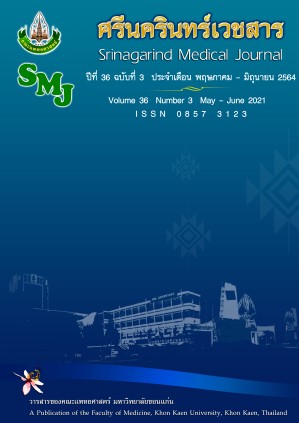ความรู้เกี่ยวกับภาวะกลืนลำบากในผู้ป่วยโรคหลอดเลือดสมองที่มีภาวะกลืนลำบาก
Abstract
หลักการและวัตถุประสงค์: ภาวะกลืนลำบากเป็นภาวะที่พบบ่อยในผู้ป่วยโรคหลอดเลือดสมอง อาจส่งผลให้เกิดภาวะแทรกซ้อนต่าง ๆ ได้เช่น ปอดติดเชื้อจากการสำลักและภาวะทุพโภชนาการ เป็นต้น ภาวะแทรกซ้อนดังกล่าวทำให้นอนโรงพยาบาลนานหรือเสียชีวิตได้ การดูแลจัดการภาวะกลืนลำบากที่ถูกต้องโดยบุคลากรทางการแพทย์รวมถึงความรู้ความเข้าใจเกี่ยวกับภาวะกลืนลำบากของผู้ป่วยและผู้ดูแลมีบทบาทสำคัญในการป้องกันการเกิดภาวะแทรกซ้อนดังกล่าวได้ ดังนั้นการศึกษานี้จึงมีวัตถุประสงค์เพื่อศึกษาระดับความรู้เรื่องภาวะกลืนลำบากของผู้ป่วยโรคหลอดเลือดสมองที่มีภาวะกลืนลำบาก
วิธีการศึกษา: เป็นการศึกษาแบบภาคตัดขวางในกลุ่มผู้ป่วยโรคหลอดเลือดสมองที่มีภาวะกลืนลำบากที่เข้ารับการตรวจรักษาที่ห้องตรวจเวชศาสตร์ฟื้นฟู โรงพยาบาลศรีนครินทร์ จำนวน 95 ราย โดยบันทึกข้อมูลพื้นฐานของอาสาสมัครทุกราย และประเมินความรู้ด้านภาวะกลืนลำบากโดยใช้แบบสอบถามซึ่งประกอบด้วยข้อคำถามด้านต่าง ๆ ดังนี้ 1) ความรู้ทั่วไป 7 ข้อ 2) การป้องกันภาวะแทรกซ้อน 8 ข้อ และ 3) การฟื้นฟูสภาพ 5 ข้อ ระดับความรู้แบ่งออกเป็น 3 ระดับตามคะแนนรวมที่ได้ของผู้เข้าร่วมวิจัยแต่ละราย (คะแนนเต็ม 20 คะแนน) ได้แก่ ระดับน้อย (1-7 คะแนน) ระดับปานกลาง (8-14 คะแนน) และ ระดับสูง (15-20 คะแนน) นำข้อมูลที่ได้มาวิเคราะห์โดยใช้สถิติเชิงพรรณนา
ผลการศึกษา: ผู้เข้าร่วมวิจัยส่วนใหญ่เป็นเพศชาย (ร้อยละ 65) มีความรู้เกี่ยวกับภาวะกลืนลำบากในผู้ป่วยโรคหลอดเลือดสมองที่มีภาวะกลืนลำบากระดับสูง ปานกลาง และต่ำ คิดเป็นร้อยละ 18, 56 และ 26 ตามลำดับ ค่าคะแนนเฉลี่ยในด้านความรู้ทั่วไป ด้านการป้องกันปอดอักเสบจากการสำลัก และ ด้านการฟื้นฟูสภาพ เป็น 4.32 ± 2.73, 3.64 ± 2.86 และ 1.52 ± 0.42 คะแนน ตามลำดับ
สรุป: ผู้ป่วยโรคหลอดเลือดสมองที่มีภาวะกลืนลำบากส่วนมากมีความรู้เรื่องภาวะกลืนลำบากอยู่ในระดับปานกลาง โดยมีคะแนนด้านการป้องกันและการฟื้นฟูสภาพน้อย
คำสำคัญ: ความรู้; หลอดเลือดสมอง; กลืนลำบาก
Background and objective: Dysphagia is a common condition in stroke patients which may result in complications such as aspiration pneumonia and malnutrition. Such complications can lead to prolonged hospitalization or death. Proper management of dysphagia by the medical personnel, including the knowledge and understanding about dysphagia of the patient and caregivers, can play an important role in complication prevention. Therefore, the researchers aimed to study the level of dysphagia knowledge among stroke patients with dysphagia.
Methods: A cross-sectional study was conducted among 95 dysphagia stroke patients who were admitted to the rehabilitation clinic, Srinagarind hospital. Demographic data were retrieved from all participants. Dysphagia knowledge was assessed by using questionnaires, which consisted of the following questions: 1) general knowledge 7 items, 2) complications prevention 8 items, and 3) rehabilitation 5 items. Then, dysphagia knowledge was categorized into 3 levels based on the total scores of each participant (full 20 points); low (1-7 points), moderate (8-14 points) and high (15-20 points). The data were analyzed using descriptive statistics.
Results: Of 95 participants, 26%, 56% and 18% of dysphagia patient had low, moderate and high level of dysphagia knowledge, respectively. The average score of general knowledge, complication prevention and rehabilitation were 4.32 ± 2.73, 3.64 ± 2.86 and 1.52 ± 0.42, respectively
Conclusions: Most stroke patients with dysphagia had dysphagia knowledge at a moderate level. Whereas the score in prevention and rehabilitation domain were low.
Keywords: knowledge; stroke; dysphagia


